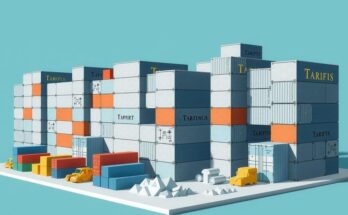In the French Caribbean, particularly in Martinique and Guadeloupe, protests erupt over high living costs driven by a legacy of colonialism. While current economic hardships trigger unrest, underlying social and political disparities, rooted in centuries of exploitation, inform the residents’ frustrations. Although authorities attempt to address immediate issues, protesters seek long-term reforms and autonomy to ensure a fair future.
For weeks, Martinique has been rocked by fierce protests over escalating living costs, with Guadeloupe witnessing similar unrest. While media coverage highlights immediate economic issues—like rising prices—a deeper analysis reveals entrenched social injustices and the lingering colonial impacts that fuel this discontent. Martinicans, despite being French citizens, struggle under a heavy burden of exorbitant prices, spending 40% more on food and earning significantly less than their mainland counterparts. As inflation pinches already tight household budgets, the latest wave of protests gains momentum, with another demonstrated planned for November 1. The discontent springs from a long-standing feeling among Martinicans and Guadeloupeans of an unbalanced relationship with mainland France, reflected in similar protests in 2009 and 2021. While most demonstrations remain peaceful, frustration has recently erupted into violence. Economic disparities are exacerbated by Martinique’s history of colonialism, which established plantation economies reliant on enslaved labor. Despite the abolition of slavery in 1848, the wealth gap persists, with a few families, primarily descendants of colonial rulers, controlling much of the wealth. Notably, Groupe Bernard Hayot, a significant player in the local market, symbolizes this concentration of power. Awareness of their colonial past drives Martinicans’ response to current economic challenges. Despite becoming French départements in 1946, granting citizenship and rights, disparities in social, economic, and environmental conditions endure. With about 80% of their food imported from Europe, the islands find themselves heavily reliant on France. The colonial legacy continues to hinder local agricultural production, particularly due to a focus on monocrop plantation systems. Farmers face additional obstacles from environmental issues, like the toxic impact of pesticides that have tainted waters and harmed public health. Knowledge of these injustices fuels the perception of neocolonialism among the island’s residents. In reaction, a decolonial mindset is gaining traction, with calls for independence and regional solidarity growing louder. The push for greater autonomy from France is evident in local leadership exploring collaborations within the Organization of Eastern Caribbean States to cultivate self-sufficiency and reduce economic disparities. Malcom Ferdinand suggests that the current struggles are deeply rooted in the historical injustice tied to colonialism. As protests ripple through the islands, there are signs of a potential shift. Recently, the French government announced an agreement aimed at cutting retail prices by 20%, a move appreciated by many but insufficient to quell the calls for more radical reform. Patrick Chamoiseau emphasizes the necessity for comprehensive social and environmental changes to break free from colonial economic structures, warning that failure to act could doom Martinicans to a continued cycle of dependency and despair.
The ongoing unrest in Martinique and Guadeloupe reveals complex layers of historical, economic, and social grievances. While immediate causes like inflation and high living costs prompt protests, they also stem from a deeply rooted legacy of colonial exploitation and inequalities that have persisted long after the end of direct colonial rule. Understanding this context is crucial to grasping the protesters’ motivations and demands for systemic change in their relationship with mainland France.
Protests in Martinique and Guadeloupe spotlight the intertwined roots of economic struggle and colonial history. While recent measures may address immediate financial concerns, the deeper call for social justice and economic autonomy persists. The legacy of colonialism looms large, pushing locals to seek transformative solutions to escape a cycle of dependency and aspire for a more equitable future.
Original Source: theconversation.com



